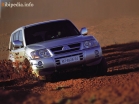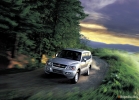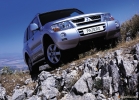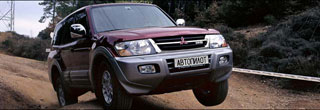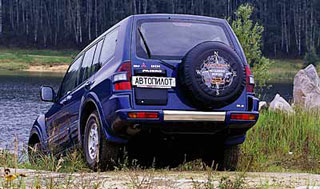Test drive Mitsubishi Pajero (Montero, Shogun) LWB 2000 - 2003 SUV
Conservative and radical
 In the early 90s of Mitsubishi, Pajori Jeep-gran Cheroki, perhaps, were the most popular imported all-terrain vehicles. In the yard of the eve of 2001, the third generation of Pajero and the second Gran of Cheroki. Outwardly, both have changed a lot, inside the Japanese is a completely new filling, while the American is a stronghold of healthy conservatism.
In the early 90s of Mitsubishi, Pajori Jeep-gran Cheroki, perhaps, were the most popular imported all-terrain vehicles. In the yard of the eve of 2001, the third generation of Pajero and the second Gran of Cheroki. Outwardly, both have changed a lot, inside the Japanese is a completely new filling, while the American is a stronghold of healthy conservatism. Mitsubishi Pajjero of the third generation was presented in the fall of 1999 and is offered to Russian customers in a three- and five-door version with a six-cylinder gasoline engine with direct injection (3.5 liters, 149 kW/202 hp) or a turbodiesel with an unrequited combustion chamber (3, 2 liters, 121 kW/165 h. P.), With five -speed mechanical or automatic transmissions.
 The Cheroki jeep-grane received a new body in the fall of 1998 and since 1999 has been sold in our country. Machines supplied by official dealers are equipped with gasoline V-shaped eight (4.7 l, 163 kW/220 hp) or in-line six (4 l, 142 kW/193 hp), as well as a five-cylinder pre-cell turbodiesel of Italian VM firms (3.1 l, 111 kW/152 l. There is no alternative gearbox - a four -speed Ain -Wuorner automatic machine.
The Cheroki jeep-grane received a new body in the fall of 1998 and since 1999 has been sold in our country. Machines supplied by official dealers are equipped with gasoline V-shaped eight (4.7 l, 163 kW/220 hp) or in-line six (4 l, 142 kW/193 hp), as well as a five-cylinder pre-cell turbodiesel of Italian VM firms (3.1 l, 111 kW/152 l. There is no alternative gearbox - a four -speed Ain -Wuorner automatic machine. It just turns out that from off -road cars and for normal roads require completely different qualities. The behavior of a modern alternate on the asphalt should be as close as possible to a good light car, but it is not entitled to unite on a crossed area. Unfortunately, some qualities are inevitably achieved at the expense of others. The real submissions of the off -road with a powerful spar frame, a dependent suspension with impressive moves, high -profile tires with a large pattern clumsy on the asphalt. Parquet all -terrain vehicles, in essence, do not differ from all -wheel drive cars, including on ground roads.
Where is the middle ground? Obviously, in each case it is different. There are not many places left in the world (but not in Russia) where cars of increased cross-country ability are really used. In the United States, where all -rounds are sold the most, only 10% of cars episodically moves on dirt roads.
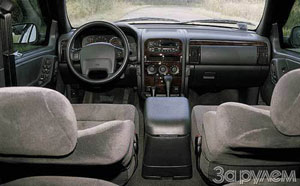 Traditions and innovations
Traditions and innovations Although, according to all the canons of the second -generation, the second -generation jeep -grane is a completely new car, it is not so radically different from its predecessor: he received a more modern appearance, it has become a little longer. Although the car did not grow up on the base, its salon has become more spacious and convenient. Of course, the body remained carrying, like all Cheroka, starting in 1987.
The design of the features is even smaller: unless the transmission with constant all -wheel drive and differentials of increased friction in both bridges is interesting. A dependent spring suspension did not undergo fundamental changes.
The third -generation Pajero, on the contrary, demonstrates the latest technologies in all their splendor - you should look at the hood. Competitors have no engines with direct injection of gasoline.
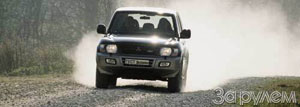 If the first and second generations of Mitsubishi Pajero were quite traditional in design - frame, with the rear dependent and anterior independent pendants, then the current one received a supporting body and an independent suspension behind. This scheme is typical for parquet all -terrain vehicles. The proprietary transmission of the Super-GENTER, which appeared on the second generation of Pajero (it combines the advantages of layouts with a constant drive and the turn off the front bridge), has been preserved-it is difficult to come up with something better.
If the first and second generations of Mitsubishi Pajero were quite traditional in design - frame, with the rear dependent and anterior independent pendants, then the current one received a supporting body and an independent suspension behind. This scheme is typical for parquet all -terrain vehicles. The proprietary transmission of the Super-GENTER, which appeared on the second generation of Pajero (it combines the advantages of layouts with a constant drive and the turn off the front bridge), has been preserved-it is difficult to come up with something better. In our test, Mitsubishi Pajero GLS met in a five-door version (price of 59 thousand dollars) and a jeep-grane of Cheroki Laredo (45 thousand dollars).
Without complaining
 The luxurious beige velor in the upholstery of the doors and seats Pajero makes an already spacious salon in appearance almost giant. The driver’s place with a wide range of adjustments allows you to find a convenient position behind a person of any height. Mitsubishi's corporate dish - sagged front seats, whose suspension rigidity can be adjusted. Three are placed behind without problems - there is enough width. Another thing is a folding third row of seats: an adult here has nowhere to put their knees. However, it is better to go badly than to go well ...
The luxurious beige velor in the upholstery of the doors and seats Pajero makes an already spacious salon in appearance almost giant. The driver’s place with a wide range of adjustments allows you to find a convenient position behind a person of any height. Mitsubishi's corporate dish - sagged front seats, whose suspension rigidity can be adjusted. Three are placed behind without problems - there is enough width. Another thing is a folding third row of seats: an adult here has nowhere to put their knees. However, it is better to go badly than to go well ... That's what color means! The dark interior of the Cheroki Gran, on the contrary, visually reduces the volume of the cabin. But the planting mannequin is not subject to color magic - he has neither head nor eyes, only a measuring rail instead of the spine and standard fiberglass buttocks.
The result is amazing: for five places there are noticeably larger! The front seat pillow is completely gigantic length - 525 mm. This is an absolute record for cars that have ever visited tests at the wheel. The fact, however: if you are below 175 cm, then find the optimal position driving a jeep. But by the fullness of the driver, the requirements are freer: the soft back and the seat pillow themselves will choose the right shape. The legs for the legs of the rear passengers are a little smaller here than in Mitsubishi, but nothing constrains the head and shoulders.
Look from the observation ditch
 We measure the road clearance on fully loaded machines, like the domestic technique, while most foreign firms provide data for the vehicle of equipped mass. The elastic elements of the suspension and tires compressed under load, of course, reduce the indicators, but you must admit: the situation where you need to plant passengers in front of each tubercle is permissible only for knowingly asphalt machines.
We measure the road clearance on fully loaded machines, like the domestic technique, while most foreign firms provide data for the vehicle of equipped mass. The elastic elements of the suspension and tires compressed under load, of course, reduce the indicators, but you must admit: the situation where you need to plant passengers in front of each tubercle is permissible only for knowingly asphalt machines. Despite the image, the Cheroki jeep -grane lost this stage of the competition - from a powerful steel plate covering the handout from below, it turned out to be only 183 mm to asphalt. Against this background, 205 mm to the plastic protection of the gas tank of Pajero look convincing. However, at the sight of the grain of Cheroka, it looks more impregnable - three -elemental protection (engine, handout, gas tank) included in the off -road package is made of steel with a thickness of at least 3 mm - it is not easy to break through such armor.
The layout of Pajero practically does not leave the front history, but the back of the body is so long that a couple of trifles are caught with it. The Cheroki Gran also is not averse to struck the row of ruts backwards, but the armor covers a low tanning tanker, over which a full -size reserve has fallen in the back.
 Directly and crooked
Directly and crooked Powerful engines imply good dynamics. The Cheroki jeep-grane with an automatic gearbox is practically not inferior to Mitsubishi Pajero with mechanics during acceleration. The first is easier, the second is more powerful.
The American is not too convenient when managing the traction - the peculiarity of the gearbox is such that it allows you to move either in the rhythm of the waltz or rock and roll - the intermediate option is excluded.
The flexible characteristic of the Japanese engine, on the contrary, makes the use of mechanical transmission very pleasant. The motor forgives errors in the choice of transmission, and the steps stretched for better economy do not force the entire row on the path between the two traffic lights.
If both cars ride confidently and on equal terms in a straight line, then in the turns of Mitsubishi it breaks forward. Independent suspensions allow it to be controlled in the same way as an ordinary passenger car. True, in the rear -wheel drive version, the car is a little reluctant to turn into a turn and with delay reacts to the actions of the steering wheel, but the full -wheel drive of the reaction is more lively and adequate, and the tendency to insufficient rotation decreases.
 The jeep is also quite predictable on steep turns, and its steering wheel is distinguished by an unusual sharpness for American machines and intelligible reactive effects. But this is only in standard modes. Sharp maneuvers, especially ligaments of turns, make a scatter into the picture - there is a tendency to skidding, course vibrations and other unpleasant symptoms. Alas, to get rid of the skateboard-effect (situations when the parallelity of the axes is disturbed with the car) with a dependent suspension is almost impossible. However, in comparison with the previous model, dangerous limits are significantly higher.
The jeep is also quite predictable on steep turns, and its steering wheel is distinguished by an unusual sharpness for American machines and intelligible reactive effects. But this is only in standard modes. Sharp maneuvers, especially ligaments of turns, make a scatter into the picture - there is a tendency to skidding, course vibrations and other unpleasant symptoms. Alas, to get rid of the skateboard-effect (situations when the parallelity of the axes is disturbed with the car) with a dependent suspension is almost impossible. However, in comparison with the previous model, dangerous limits are significantly higher. When the roads end ...
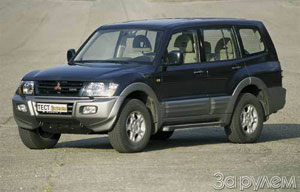 ... Bad roads begin. The rolled and not too broken primer is better perceived at the wheel of Pajero. A comfortable suspension, a minimum of noise and vibrations - drift. However, with the advent of transverse promoin or deep pits, the yellow hand of a leader passes to the Cheroka Gran. On good roads, his suspension is harsh, but according to the old primer, he can move much faster and is not at all afraid of pits in the rut - the dependent suspension provides a constant road clearance, the size of which is not affected by the fluctuations of the machine. The slippery dirty plot will also be overcome more confidently - the car with an automatic machine does not stall, and the self -locking differentials of the square -diode will help to get out on solid soil if the car has not yet laid down on the belly. Disadvantage of traction is the impossible situation for the Cheroka Gran. A low gear with a number of 2.72 guarantees that the wheels will rotate in any case.
... Bad roads begin. The rolled and not too broken primer is better perceived at the wheel of Pajero. A comfortable suspension, a minimum of noise and vibrations - drift. However, with the advent of transverse promoin or deep pits, the yellow hand of a leader passes to the Cheroka Gran. On good roads, his suspension is harsh, but according to the old primer, he can move much faster and is not at all afraid of pits in the rut - the dependent suspension provides a constant road clearance, the size of which is not affected by the fluctuations of the machine. The slippery dirty plot will also be overcome more confidently - the car with an automatic machine does not stall, and the self -locking differentials of the square -diode will help to get out on solid soil if the car has not yet laid down on the belly. Disadvantage of traction is the impossible situation for the Cheroka Gran. A low gear with a number of 2.72 guarantees that the wheels will rotate in any case. Pajero implies some experience of the driver in off -road driving - you need to choose a transmission mode in advance. In extreme cases, the rear axle differential blocking will help. It is not recommended to storm potholes from acceleration - it is surprising to break the suspension surprisingly. It remains to pass complex areas in the tightness, avoiding touching the bottom of the soil - cautious and experienced tactics.
To the discussions about pendants
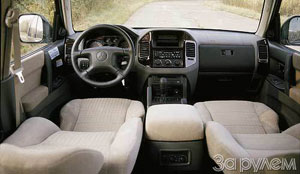 So, independent is better on the asphalt, dependent - in the rut. But in which case, the wheels will keep contact with the soil on crossed terrain longer? To do this, we measured the passages of suspensions. The advantage of Cheroka's Gran over Pajero was overwhelming. In addition, the American diagonally shown the excellent hardness of the body - all the doors, including the rear, opened and closed perfectly. The Japanese did not bear such torture: the rear doors opened with difficulty, and the fifth was completely distorted almost by a centimeter. Fortunately, after returning the suspension to its original state, everything returned to normal, leaving, however, an unpleasant offspring: the second generation paramiller did not know such problems.
So, independent is better on the asphalt, dependent - in the rut. But in which case, the wheels will keep contact with the soil on crossed terrain longer? To do this, we measured the passages of suspensions. The advantage of Cheroka's Gran over Pajero was overwhelming. In addition, the American diagonally shown the excellent hardness of the body - all the doors, including the rear, opened and closed perfectly. The Japanese did not bear such torture: the rear doors opened with difficulty, and the fifth was completely distorted almost by a centimeter. Fortunately, after returning the suspension to its original state, everything returned to normal, leaving, however, an unpleasant offspring: the second generation paramiller did not know such problems. WHO IS WHO?
 Cars more than 40 thousand dollars are not bought in order to expose them to stress loads on off -road. Prestigious all -resistant people serve the owners mainly on city streets and suburban highways, only occasionally leaving for simple rural routes. In this situation, Pajero's leadership is difficult to challenge. Masters of the compromise from Japan know exactly what qualities and in what proportion should the car have.
Cars more than 40 thousand dollars are not bought in order to expose them to stress loads on off -road. Prestigious all -resistant people serve the owners mainly on city streets and suburban highways, only occasionally leaving for simple rural routes. In this situation, Pajero's leadership is difficult to challenge. Masters of the compromise from Japan know exactly what qualities and in what proportion should the car have. However, there are still psychological features. Cars of this class are required to guarantee the driver unshakable confidence that he will pass where he wants. And this feeling behind the wheel of Gran Cheroki is much stronger. Let his compromise are not so sophisticated and new, the character of the jeep is much more by an order of magnitude.
The editors thanks Rolf Holding LLC and Major Auto for the cars provided. Detailed information in the dealer price section.
 Mitsubishi-Pajero
Mitsubishi-Pajero + A painful motor with good fuel saving opportunities, spacious interior, low noise, comfortable suspension, wide transmission capabilities, excellent handling.
- transmission vibrations at high speed, slight hardness of the body, small suspension moves, an uncomfortable third row of seats.
Jeep Grand Cheroki
+ A traction engine, a spacious salon, a constant all -wheel drive with a blocked center differential, high -friction differentials in bridges, a powerful reducing gear, good protection of units from below, effective brakes.
- inconvenient traction control, a small road clearance, a deterioration in controllability in emergency modes, a relatively small trunk.
Anatoly Fomin, Anatoly Karpenkov
Photo by Vladimir Knyazev
Source: The magazine "Driving"
Mitsubishi Pajero (Montero, Shogun) LWB 2000 - 2003
Mitsubishi Pajero (Montero, Shogun) LWB 2000 - 2003
Mitsubishi Pajero Faults 5 doors: Detailed information| Pajero (Montero, Shogun) LWB 2000 - 2003 | |
|---|---|
| Engine |  |
| Transmission |  |
| Control system and suspension |  |
| Brake system |  |
| Air heating and air conditioning |  |
| Launch and charging system |  |
| Electric components and so on |  |
| Corrosion body stability |

